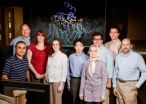Medical ethicists working in hospitals need to have standards
Cheryl Cline is co-chair of a national group developing practice guidelines for experts who consult with health professionals on ethical issues
2011-06-01
(Press-News.org) A Queen's University professor is helping standardize practices for healthcare ethicists who consult and give guidance on medical ethics issues to doctors, nurses and patients across the country.
"It's time for healthcare ethicists to have some formal practice guidelines, a governing code of ethics, and uniform education and certification standards," says Cheryl Cline, Director of the Office of Bioethics in the Faculty of Health Sciences and Clinical Ethicist at Kingston General Hospital. "Our job is to provide Canadian patients and their families with high quality ethics services and formal guidelines will help us achieve this."
Dr. Cline is Co-Chair of Practicing Healthcare Ethicists Exploring Professionalization (PHEEP), a national organization that has been spearheading the campaign for two years.
The field of healthcare ethics practice is relatively new. The field has grown exponentially over the last 20 years and many hospitals now have ethicists on staff. Yet, unlike other professionals who work in healthcare, the qualifications of ethicists vary across Canada and there is no certification process.
"This is the natural evolution of a young field. People feel we've gotten to the stage where there are some fairly standard practices being followed informally, and we would like to codify these as the next step in the professionalization of ethicists in Canada," says Dr. Cline. "And we are doing this in typical Canadian fashion. Not everyone agrees with healthcare ethicists becoming a formal profession so we are consulting as widely as possible."
PHEEP is currently hosting a two-day national conference funded by the Canadian Institutes of Health Research in Halifax to decide on the field's guiding principles and develop a process for the creation of standards. Dr. Cline and her colleagues hope to have everything in place within a year.
INFORMATION:
END
ELSE PRESS RELEASES FROM THIS DATE:
2011-06-01
How do people who speak more than one language keep from mixing them up? How do they find the right word in the right language when being fluent in just one language means knowing about 30,000 words?
That's what science has wondered about for decades, offering complicated theories on how the brain processes more than one language and sometimes theorizing that bilingualism degrades cognitive performance.
But University of Kansas psycholinguist Mike Vitevitch thinks that complicated explanations of how the brain processes two or more languages overlook a straightforward ...
2011-06-01
Alexandria, VA –Next week marks the 67th anniversary of D-Day, when the Allies stormed the beaches at Normandy, France, and changed the face of World War II. Not much evidence of the war remains in Normandy: a few dilapidated relics, a cemetery, a war memorial. But something else was left behind that cannot be seen by the naked eye: shrapnel and iron and glass beads left over from the D-Day invasions in 1944.
Two geologists visited Omaha Beach in 1988 and collected samples of the sand. Upon returning to their labs, they examined the sand under microscopes and discovered ...
2011-06-01
In the 30 years since the first reported cases of a mysterious illness now known as AIDS, researchers have made extraordinary advances in understanding, treating and preventing the disease. Now the challenge, according to experts at the National Institute of Allergy and Infectious Diseases (NIAID), part of the National Institutes of Health, is to build on those successes to control and, ultimately, end the HIV/AIDS pandemic.
In an article published online today by the Annals of Internal Medicine, Anthony S. Fauci, M.D., NIAID Director, and Carl W. Dieffenbach, Ph.D., ...
2011-06-01
Each time you see a person that you know, your brain rapidly and seemingly effortlessly recognizes that person by his or her face.
Until now, scientists believed that only a couple of brain areas mediate facial recognition. However, Carnegie Mellon University's Marlene Behrmann, David Plaut and Adrian Nestor have discovered that an entire network of cortical areas work together to identify faces. Published in the current issue of the Proceedings of the National Academy of Sciences (PNAS), their findings will change the future of neural visual perception research and ...
2011-06-01
The following highlights summarize research papers that have been recently published in Geochemistry, Geophysics, Geosystems (G-Cubed), Geophysical Research Letters (GRL), the Journal of Geophysical Research-Atmospheres (JGR-D), the Journal of Geophysical Research-Biogeosciences (JGR-G), the Journal of Geophysical Research-Space Physics (JGR-A), Paleoceanography (PA), and Water Resources Research (WRR).
1. Analyzing subsurface oil and gas intrusions from Gulf spill
After the Deepwater Horizon blowout in 2010, hydrocarbons were released into the Gulf of Mexico. These ...
2011-06-01
CAMDEN – If you think that you're using humanely produced eggs for your omelets or deviled eggs, think again. Egg companies recognize that most Americans care about the welfare of farmed animals and many market their eggs with labels claiming the hens were treated well. But a Rutgers–Camden law professor warns that many of the animal welfare claims on egg cartons aren't all that they're cracked up to be.
Sheila Rodriguez, a clinical associate professor at the Rutgers School of Law–Camden, asserts that food consumers have a right to know how farm animals are raised and, ...
2011-06-01
CHAMPAIGN, lll. — Blood clotting is a complicated business, particularly for those trying to understand how the body responds to injury. In a new study, researchers report that they are the first to describe in atomic detail a chemical interaction that is vital to blood clotting. This interaction – between a clotting factor and a cell membrane – has baffled scientists for decades.
The study appears online in the Journal of Biological Chemistry.
"For decades, people have known that blood-clotting proteins have to bind to a cell membrane in order for the clotting reaction ...
2011-06-01
A team of Scripps Research Institute scientists has found a key biological mechanism underpinning the transition to alcohol dependence. This finding opens the door to the development of drugs to manage excessive alcohol consumption.
"Our focus in this study, like much of our lab's research, was to examine the role of the brain's stress system in compulsive alcohol drinking driven by the aversive aspects of alcohol withdrawal," said Scripps Research Associate Professor Marisa Roberto, Ph.D., senior author of the study.
"A major goal for this study," added Research Associate ...
2011-06-01
In the treeless, flat Prairie, you'd think a city would provide a good home for bats who like to snuggle up and roost in trees and buildings. But researchers at the University of Calgary made the surprising discovery that the urban landscape is far from ideal for these animals.
"I was really surprised," says Dr. Joanna Coleman, a sessional lecturer and recent PhD graduate in biological sciences at the University of Calgary and lead author of the study. "I fully expected bats to benefit from the expected increase in availability of roosts and food – insects -- in the city. ...
2011-06-01
PHILADELPHIA — Engineering structures on the smallest possible scales — using molecules and individual atoms as building blocks — is both physically and conceptually challenging. An interdisciplinary team of researchers at the University of Pennsylvania has now developed a method of computationally selecting the best of these blocks, drawing inspiration from the similar behavior of proteins in making biological structures.
The team was led by postdoctoral fellow Gevorg Grigoryan and professor William DeGrado of the Department of Biochemistry and Biophysics in Penn's Perelman ...
LAST 30 PRESS RELEASES:
[Press-News.org] Medical ethicists working in hospitals need to have standards
Cheryl Cline is co-chair of a national group developing practice guidelines for experts who consult with health professionals on ethical issues


